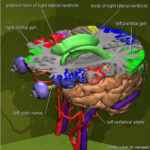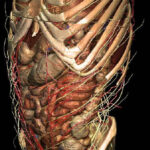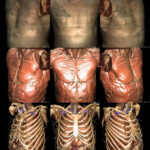The VOXEL-MAN 3D Navigators are a family of interactive atlases of human anatomy and radiology. The following 3D Navigators were published:
 VOXEL-MAN 3D Navigator: Brain and Skull — Interactive atlas of anatomy of the brain and skull
VOXEL-MAN 3D Navigator: Brain and Skull — Interactive atlas of anatomy of the brain and skull
 VOXEL-MAN 3D Navigator: Inner Organs — Interactive atlas of anatomy of the internal organs
VOXEL-MAN 3D Navigator: Inner Organs — Interactive atlas of anatomy of the internal organs
 VOXEL-MAN 3D Navigator: Upper Limb — Interactive atlas of anatomy of the hand, arm and shoulder
VOXEL-MAN 3D Navigator: Upper Limb — Interactive atlas of anatomy of the hand, arm and shoulder
Other applications of this technology include the Virtual Mummy and the multimedia training system EUS meets VOXEL-MAN.
Technology
For a long time, interactive visualization of medical 3D models was only possible on high-end workstations. This applied in particular to high-resolution voxel models, such as those derived from the Visible Human. To enable a broader application, a different approach was needed.
 For this purpose, a new paradigm based on pre-calculated interactive scenes of the model was developed. As the base technology, the Apple QuickTime VR file format was chosen. In contrast to a linear film, a two-dimensional matrix of images is available, so that the scene can be created and explored with two degrees of freedom.
For this purpose, a new paradigm based on pre-calculated interactive scenes of the model was developed. As the base technology, the Apple QuickTime VR file format was chosen. In contrast to a linear film, a two-dimensional matrix of images is available, so that the scene can be created and explored with two degrees of freedom.
The two degrees of freedom can be used as desired, for example
- Rotation of the model around two axes
- Rotation around one axis, combined with a stepwise removal or addition of anatomical layers
- Moving two orthogonal dissecting planes
As a decisive innovation, all images of the scene are extended by an invisible layer of object labels, which provide a pixel-wise link to an anatomical knowledge base. The displayed objects can thus be queried by simply clicking them in the image. Likewise, anatomical structures can be annotated, painted, or searched.
As a result, a user can explore a scene with much of the functionality of a full 3D visualization system, but in real time and with a much easier handling.
Availability
The VOXEL-MAN 3D Navigators are available for free download under a Creative Commons license.
References
- Bernhard Pflesser, Andreas Petersik, Andreas Pommert, Martin Riemer, Rainer Schubert, Ulf Tiede, Karl Heinz Höhne, Udo Schumacher, Ernst Richter: Exploring the Visible Human’s inner organs with the VOXEL-MAN 3D Navigator. Studies in Health Technology and Informatics 81: Medicine Meets Virtual Reality, 2001, 379-385.
- Rainer Schubert, Bernhard Pflesser, Andreas Pommert, Kay Priesmeyer, Martin Riemer, Thomas Schiemann, Ulf Tiede, Paul Steiner, Karl Heinz Höhne: Interactive volume visualization using “intelligent movies”. Studies in Health Technology and Informatics 62: Medicine Meets Virtual Reality, 1999, 321-327.